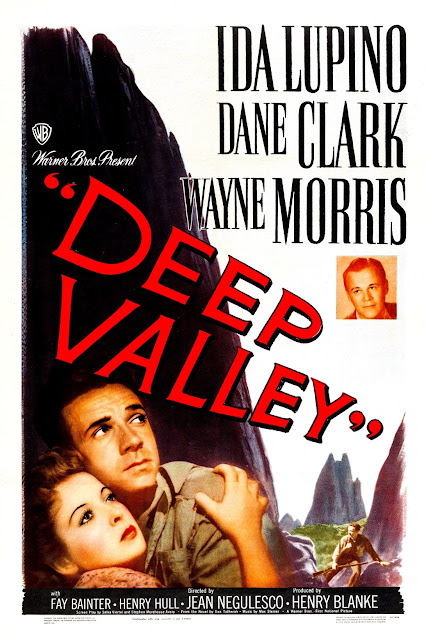Watch: 07/04/2023
Format: TCM
Viewing: First
Director: Jean Negulesco
This one felt like it had pieces of noir mixed in with American Gothic melodrama more than what you think of when you start searching the shelves for a noir. And that's fine. It's not like people in 1947 were setting out to make "noir".
As a movie featuring Ida Lupino, I was pre-inclined to give it a shot. And she's great! Maybe not as good as in other things, but she and Fay Bainter - who plays her mother - are both terrific in this movie.
But I'm not sure the movie quite sticks the landing, and it's probably 15 minutes too long at an hour and 44 minutes. It also really does echo High Sierra, which Lupino had starred in back in 1941, and it almost feels like she should have played the young naive woman of this film in 1941 and the more mature woman of High Sierra in '47. But that's not how it worked out, and I don't have a time machine to tell them what to do.
Lupino plays a 22 year old (she's 28ish here) who has been the middle-man for her parents who have been at a stalemate for years since her father struck her mother. Now, the two don't talk as their once grand house falls apart around them. The mother hasn't left her room in *years* (don't ask me the logistics) having Lupino wait on her hand and foot, and the father lives downstairs and tends to the farm. Sort of. The entire house is falling apart and Lupino is a nervous mess, complete with a crippling stutter.
Meanwhile, a highway (the PCH, maybe?) is coming along the other side of the hill where she lives in a Deep Valley. The road is being built with prison labor*, and each day Lupino sneaks off to watch shirtless men labor in the sun. No, really. It's incredibly horny.
Anyway, she has a favorite in Dane Clark. One day the crew comes to the farmhouse to fill up some water buckets and while there, Clark gets in an altercation with a guard and gets sent to a shed awaiting a return to San Quentin. A landslide occurs, and Clark escapes in the chaos. Meanwhile, Lupino sees the walls closing in on her (relating to the prisoners) and makes good her own escape into the woods.
The pair come across each other and fall in love/ make it off camera.
Turns our Clark has a bit of a temper, and is known to basically go into rages and deck people, which is how he ended up in jail. But he's convinced the love of a good Lupino will fix all this.
Lupino runs home to grab some supplies so the two can make good their escape, but first realizes in her absence, her parents figured their shit out, and also she's somewhat trapped by the posse using her house and not wanting to draw suspicion.
The movie walks some fine lines. Clearly Lupino's naive virgin has never really known a man before and is throwing herself at the first guy to really take her fancy. Similarly, Clark is putting way too much on Lupino as an angel who will save him from himself. And the movie never really does anything to de-romanticize all of that. Or address that Clark "doesn't mean it", but he sure has homicidal impulses and if Lupino were to leave with him, sure seems like she'd be dead within a year.
I *do* think the movie wants to say something about this, but it's left to a brief bit of dialog from her mother to put the seed of doubt in the audience's mind. And I'm not sure the movie (and 1947) is aware of what it's setting up. But like many movies of young couples caught in an impossible situation (see: They Live By Night), it's all Romeo and Juliet star-crossed romance. People are gonna wind up dead before things are over.
According to show-notes presented by Eddie Muller, this could have been a John Garfield movie, and we might have had a marginally different picture if that had occurred. We have to buy a lot in a short amount of time, and the movie doesn't always sell it. I don't know how that looks with Garfield.
But, also, the movie wants us to believe Lupino doesn't look great in a blouse and jeans and that makes the movie a liar.
Still, it's an interesting movie if not a great one. Not all of these are grand slams.
*no, this is never addressed


No comments:
Post a Comment